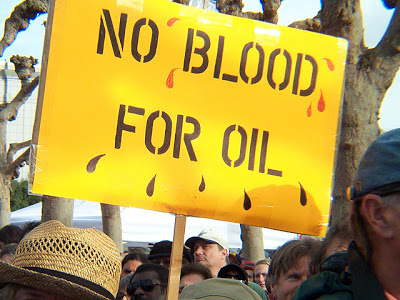 |
| Image from deepforest.org. |
‘No blood for oil!’
Important truths behind
an anti-war slogan
Underneath the complex relationships and shifting strategies, the obvious question lingers: If the Middle East were not home to the largest reserves of the most easily accessible oil in the world, would we have gone to war in Iraq?
By Robert Jensen | The Rag Blog | March 19, 2013
I have never been big on chanting, which means I have spent lots of time at anti-war protests shuffling uncomfortably, mouthing words that others are shouting out.
“What do we want?” JUSTICE! (and a quick end to the chanting, please). “When do we want it?” NOW! (or as soon as possible, please).
Part of my discomfort no doubt comes from the fact that I’m tone-deaf with no sense of rhythm (have I mentioned that I’m a white guy from North Dakota?). But there’s also my frustration with condensing a complex analysis into a chantable sentence (have I mentioned that I’m a nerdy professor?).
Still, chants are part of political rallies, and I’m part of political movements that rally. So, I try to use the slogans as a starting point to explore issues in more depth. One of the most important of those chants from anti-war rallies of the past couple of decades is “No blood for oil.” On the 10th anniversary of the U.S. invasion of Iraq, that slogan remains as important as ever.
Sophisticated and/or respectable people tend to reject the underlying claim as crude and/or unpatriotic. How can anyone believe in such a simplistic explanation, that wars are fought for oil? How could anyone imagine the United States pursuing such a crass and greedy goal?
These more enlightened folk will allow, and even encourage, critique of the invasion of Iraq — maybe the military campaign was ill-conceived and poorly executed, maybe the intelligence about weapons was fraudulent, maybe plans for the so-called democratizing of Iraq were naïve — but they scoff at the idea that the United States would go to war over the most crucial commodity in an industrialized world. Certainly anyone who suggests countries fight over energy resources is out of touch with reality, right?
That’s what conservative commentator Bill Kristol suggested when it was widely circulated that former U.S. senator and new Secretary of Defense Chuck Hagel had said in 2007, “People say we’re not fighting for oil. Of course we are.”
Kristol described “this vulgar and disgusting charge” as a “far-left trope” so ludicrous that mainstream opponents of the war had renounced it. Indeed, Hagel didn’t defend that statement during the confirmation process, and the Obama administration wasn’t eager for a debate of this crucial question.
 So, conservatives demand ideological allegiance to the idea that the United States is a uniquely benevolent great power that doesn’t go to war for economic reasons, and centrist/liberals play along, sometimes repeating the same “mainstream trope” and other times remaining strategically silent.
So, conservatives demand ideological allegiance to the idea that the United States is a uniquely benevolent great power that doesn’t go to war for economic reasons, and centrist/liberals play along, sometimes repeating the same “mainstream trope” and other times remaining strategically silent.
Whether some policymakers internalize this mythology so thoroughly that they believe it — and no doubt some do — the rhetoric doesn’t prevent the United States from acting on the long-term goal of maximizing influence over the region.
This control doesn’t follow the old European colonial model; the United States didn’t invade Iraq to rule by force permanently or to take direct possession of its oil industry. Instead, policymakers over the years have patched together a patchwork that changes tactics as necessary. That’s why the United States strongly supports both the fundamentalist Islamic monarchy in Saudi Arabia and the Western-oriented Israeli government that occupies Arab land.
We back brutal Middle Eastern dictators as long as they advance our policy goals, and then express horror at their crimes when they get uppity (for example, our quiet alliance with Saddam Hussein when he was attacking Iran in the 1980s ended when he invaded Kuwait in 1990).
But underneath the complex relationships and shifting strategies, the obvious question lingers: If the Middle East were not home to the largest reserves of the most easily accessible oil in the world, would we have gone to war in Iraq? Would so much of U.S. military power in recent decades have been focused on the Middle East if the main export from the region were figs?
I ask ordinary people this question all the time: Why do U.S. policymakers care so much about the Middle East? Whether the audiences are young or old, conservative or liberal, the answer is always the same: Oil, of course.
While it may not be polite to admit this in sophisticated and respectable circles today, U.S. policy in the Middle East since the end of World War II has been about maintaining a flow of oil and — just as important — a flow of oil profits that is advantageous to U.S. economic interests, especially as defined by elites.
That doesn’t mean there is a single clear policy in every moment. But scare tactics about weapons of mass destruction and empty rhetoric about promoting democracy are cover stories, used by Republicans and Democrats alike, to justify the U.S. military presence in region.
Whether it’s WMD in Iraq or a nuclear weapons program in Iran, the players change and the script stays the same — to quote former President George H.W. Bush, “What we say goes.” On the heels of military defeats in Iraq and Afghanistan, the United States these days has a harder time dictating terms; Obama isn’t pushing new aggression, but neither is he arguing for a significant shift in policy.
Our industrial world runs on oil, and it won’t be easy to reshape that world to wean ourselves off this dirty and dwindling fuel. There’s no guarantee that we can even do it, and there’s no use pretending that the flow of Middle East oil doesn’t matter as we struggle to face these realities.
But to bolster our commitment to the difficult work needed for the transition to a sustainable energy system, we can start the process by acknowledging that the quest to control the flow of oil and oil profits has meant death and destruction in the Middle East, leaving us neither safe nor economically secure.
On moral and practical grounds, future policy should be guided by a simple principle: No blood for oil.
This article was also posted to and first published by the Austin American-Statesman.
[Robert Jensen is a professor in the School of Journalism at the University of Texas at Austin and board member of the Third Coast Activist Resource Center in Austin. He is the author of Arguing for Our Lives: A User’s Guide to Constructive Dialogue (City Lights, 2013). His writing is published extensively in mainstream and alternative media. Robert Jensen can be reached at rjensen@austin.utexas.edu. Read more articles by Robert Jensen on The Rag Blog.]


















Bravo! Well said professor.
I would add to the list. i.e. not just blood for oil, but the US has become a mercenary army that executes the policies of a criminal bankster elite that reshapes the world to its financial benefit.
My youngest son recently talked with me about joining the military. He pointed out the many educational and other benefits that would come from a tour or two in uniform. I pointed out the hypocrisy of the US military mission, that we no longer aim to defend the homeland, but rather to expand an empire. I pointed out there are many ways to serve his county and community, and he has already been on countless projects with me to serve the poor and homeless. I suggested if he was set on joining, to join the coast guard.
After his own reading and studying and questioning. He decided that military service was not something he wanted to make a part of his life. He is a smart kid 🙂
– Extremist2TheDHS
Way to go Bob.
I made and carried a “No Blood for Oil” sign in a Veterans Day parade here in 1990.
I wish people, news sources, would mention that there was an unrelenting war on Iraq starting in 1991 ( I’ll let the “softening up” phase in 1990 go) and the war never let up for a single day between 1991 and 2003. Then there was the second ground invasion and occupation in March of 2003, which is not over no matter what the official word is. People forget these facts. I hear it said that the war on Afghanistan is 12 years old and so it is our longest war. 22 years is longer. What that says is that if other people are dying as a result of U.S. military action its not a war until and unless U.S. soldiers are also being killed. The lives of non-U.S. citizens do not count. But we anti-war folks see the world as one big family so we should not fall into these false categorical traps.
Wars are profit centers in themselves. Wars are provoked in order to keep the war profiteers in business. Winning and losing is for sports. Having the war is a constant win for Raytheon, for one instance. Did we lose in Vietnam? Does Halliburton care? Natural resources, cheap labor and markets are important but its way better if there is a war over them. Where is the money in “working it out”, finding common ground, diplomacy and all that sissy stuff?
I wonder how many “acts of war” it takes before its a war. How many drone strikes on a country must the U.S. make before we can say that the U.S. is at war with (fill in the blank).
Alan